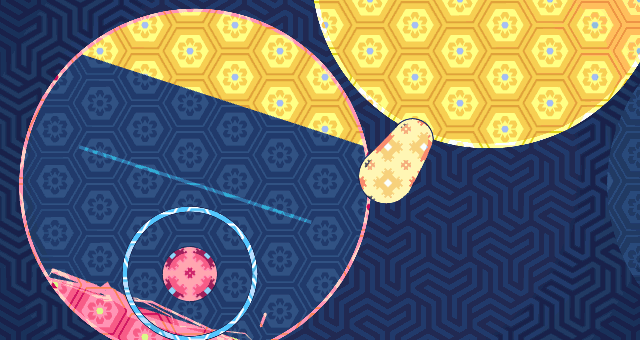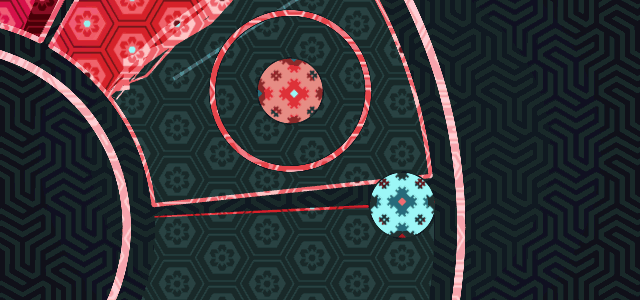JUMP TO
Introduction / Fundamentals / Dash / Cut / Wind / Ghost / Shoot / Poke / Nest / Pulse / Leech / Stim / Corp
PREVIOUS: Stim
CORP
While every other power in BOTOLO preserves at least some fundamentals, Corp seems at times to be playing an entirely different game. Some players are drawn to this, others repulsed.
The second of the defensive powers in the game, and certainly one of the most conceptual, Corp grants the user a "fake shield". Whenever Corp corps, a timer appears around them, lasting just over three seconds. While this timer ticks, Corp may neither block nor corp again. If the attacker steals from Corp during this period, Corp retains the ball and recieves points as though they had blocked the attempted steal. If the attacker waits, however, and allows the timer to expire, Corp ejects the ball and loses all points they gained during the corp. Yes, Corp may actually lose progress in a zone, the only power in the game capable of doing so.

From an aesthetic standpoint, the attacker cannot differentiate between a corp and a block. They look the same, they sound the same, but the proper response to each is different. The attacker must decipher, based on intuition and careful study of the other player's mind, whether Corp is playing BOTOLO or Corp is playing Corp.
When Corp blocks regularly, a timer will appear around it, similar to when it has corped. This timer, however, does nothing on completion, and can be cancelled by blocking again or corping.
Until a corp is resolved, the game prevents the corping player from capturing any zone. To capture the zone, the attacker must steal from Corp. Otherwise, Corp's points will just hover in the middle of the zone until the timer runs out and reverts them to their pre-corp state.

Typically, when the corp timer expires, the attacker receives a number of points in whatever zone the Corp player was standing. However, if the Corp player is standing off-zone when the timer ends, the game will not know which zone to send these extra points to and will thus not award them.
You might think of Corp, in many ways, as a defensive Pulse. However, rather than granting the player a mixup between steal and an anti-steal, it grants the player a mixup between block and anti-block. The two powers should be played very similarly. Be mindful of your actions and don't corp randomly - your "random" is likely just a set of complex habits a better player could intuit and exploit.
Where Pulse tends to speed up the game, however, Corp slows it down. The proper response to a corp is patience, and three seconds of it. Anything requiring three seconds of patience will deeply frustrate certain opponents, and frustrated opponents tend to act against their own favor. Even once an opponent correctly sees your corp and begins to wait, at any point in those three seconds they amy second-guess themselves into the wrong decision.

Due to a certain amount of randomness in human decisions, Corp will usually guarantee you a certain minimum number of points. Don't mistake this for success, however. Corp increases the margin of error for victory on both sides in the short term, making more skilled opponents win less and less skilled opponents win more. Now, that doesn't mean Corp lets new players defeat pros for free. It simply means that skill with Corp is better measured by the whole match than by any single interaction within it. Perhaps this is the reason beginners (at least, those not outright bewildered by corp's utter rejection of BOTOLO fundamentals) tend to favor this class. Corp immediately makes their losses *feel* narrower.

In a very general sense, I advise that a Corp player always endeavor to act consciously, thoughtfully and without randomness, but I'd like to address a few more specific techniques as well.
I often see Corp players abandon their zone when they realize I've discovered their corp. While this reduces the number of points they’ll give away, I remain unconvinced that it is always the proper response. If I notice that you fold early every time you believe I've called out your corp, I no longer need to guess whether or not you are corping. Instead, I'll simply wait. If you run off-zone, I'll know you were corping, but if you remain in place, I may safely steal. Sometimes, you just need to take the hit and hold a bad corp to the end. You must establish credibility and confidence in your bluffs. Give the opponent no possible tell as to whether your previous block was true or corp. Once you've established this credibility, it should be fine to run off-zone occasionally (but not every time).

Corp also allows you to spend your entire shield without losing the ball. Should you use your final shield on a corp, and should the opponent steal from you thereafter, you will score points and regain a small amount of shield. Conversely, if the opponent waits expecting a corp and you haven't corped, you will begin to regain shield immediately after the timer runs out. Because having no shield does not leave you defenseless as corp, one could almost argue that Corp has more shield available to it than any other power.
Remember never to corp while the opponent is outside your steal range. Blocking when you've no need to block will raise suspicion in the mind of any clever opponent.
If you've corped and the opponent calls you out, all is not lost. When the attacker steals from you, both you and your opponent's positions control the angle at which the ball flies. When you lose the ball to Corp's timer, however, the ball flies at whatever angle you're currently holding the thumbstick. Be sure to at least angle the ball from a bad corp in your favor.

Like Poke, Corp's defensive nature means it will often be used in conjunction with the opponent's power...
Corp vs Dash - Instead of answering Corp's defining question ("Am I blocking or bluffing?") Dash may opt to knock Corp into cutlines. Dash can chose to do this against any power, however, so it doesn't affect Corp especially.
Corp vs Wind - Similar to Dash, Wind will try to push you into cutlines. Be mindful of the cutlines and you should be alright. It's also possible, depending on their windstream placement, for a sub-par wind player to strand or delay themselves from reaching you during a corp. If you see this happening, consider "accidentally" getting caught in their windstream and floating down to them.
Corp vs Ghost - While a skilled ghost may knock you into cutlines, it's not a significant concern.
Corp vs Cut - Cut may completely ignore Corp, should you place yourself in a checkmate position. However, if you know they don't intend to steal from you anyway, their cutline can provide a convenient escape from a bad corp.
Corp vs Nest - Nest doesn't really have any good response to Corp.
Corp vs Shoot - When a shot hits a corping defender, it acts as though the attacker just attempted to steal. The shot is deflected, Corp receives a small amount of points and the corp ends. This provides the opponent a relatively cheap way to check your bluff, but it will still cost them should they consistently guess wrong. More concerning than the shots that hit you, however, are the shots that do not. Threatening a player by queueing shot typically incites them to predict and block its release. Corp, however, cannot block while corping. Depending on how you play, blocking in anticipating of unfired shots could giveaway whether or not you've corped. If you wish to make the two states indistinguishable, you must allow yourself to be hit by at least some unfired shots. In certain cases, the points you lose from doing so may outweigh the worth of your bluff's integrity.
Corp vs Pulse - This match-up is weird as hell. When Pulse pulses a corping Corp, the game acts as though Corp blocked the pulse, awarding points to Pulse and un-corping the corping Corp. I know that sentence sounds like a bunch of swears in some ill-considered fantasy language, but, trust me, it's English. If Pulse sense's Corps bluff, in other words, instead of waiting for the timer to expire it may instead pulse. This robs Corp of its ability to dictate the pace of the match. You must now play at Pulse's speed, rather than forcing them to sit and stew in their own anxiety. Also bear in mind that pulse covers both block and corp. Pulse may play purely in anticipation of your blocks and will still benefit from hitting your corps as well.
Corp vs Stim - If Stim correctly predicts a corp, it may build charge for free until Corp ejects the ball. Stim also has a tool to test your bluff in "tapping" up their charge to provoke a response from you. If you do not respond to these short taps, it may be taken as a sign you are corping. To maintain a perfect poker face, you would have to pretend their charge does not exist at all and never respond to it, even when you can. This would grant Stim full charge frequently and for free - a hefty price to pay.
Corp vs Leech - Of any class, Leech might have the most effective punish against a bad corp. Unless you've spent your entire shield already, Leech may drain your shield with impunity while you are corping. Provided they allow time for your shield to regrow rather than leeching you into nothing, Leech may gain an enormous amount of points from a single correct prediction. On top of all that, you'll lose points from a bad corp once the timer ends. When perfectly executed, Leech could capture the majority of a zone this way. Leech may also execute Stim's "tapping" technique to investigate whether a corp is true or bluffed. Put that all together and... it's a bad match-up for Corp.